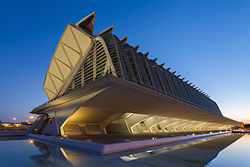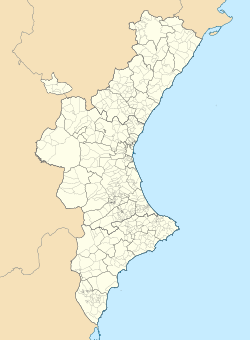Museu de les Ciències Príncipe Felipe
 External view of the museum from the southeast | |
| Established | 13 November 2000 |
|---|---|
| Location | City of Arts and Sciences, Valencia, Spain |
| Coordinates | 39°27′21″N 0°21′6″W / 39.45583°N 0.35167°W |
| Type | Science museum |
| Visitors | 891,645 (2019)[1] |
| Director | Manuel Toharia |
| Curator | Generalitat Valenciana |
| Public transit access | Alameda metro station (at distance) |
| Website | Príncipe Felipe Science Museum |
The Museu de les Ciències Príncipe Felipe (Valencian: Museu de les Ciències Príncep Felip, Spanish: Museo de las Ciencias Príncipe Felipe, anglicised as "Science Museum Príncipe Felipe")[a] is a science museum in Valencia, Spain. It is part of the City of Arts and Sciences, an architectural complex within the city, and can be found at the end of Luis García Berlanga Street. Its director is Manuel Toharia, a Spanish science writer and television personality.[2]
The building is over 40,000 square metres (430,000 sq ft), has a height of 55 metres (180 ft),[3] and it resembles the skeleton of a whale,[3][4] a façade that was designed by Santiago Calatrava and was built by a joint venture of Fomento de Construcciones y Contratas and Necso.[5] Its construction started around 1994, it was symbolically inaugurated in March 2000 by Felipe, Prince of Asturias (later King Felipe VI), and it opened on 13 November 2000 with an investment of 26 billion pesetas.[6]
The purpose of the museum is to have interactive exhibitions and temporary collections related to science and technology without valuable items.[6] Some scenes from the film Tomorrowland (2015) were filmed at the City of Arts and Sciences, including some shots on the museum's cantilever.[7]
Gallery
[edit]-
View of the museum from the southwest
-
Foucault's pendulum in the museum
-
A climate change exhibition
Notes
[edit]- ^ Pronunciation, Valencian: [muˈzɛw ðe les siˈɛnsies ˈpɾinsep feˈlip], Spanish: [muˈseo ðe las ˈθjenθjas ˈpɾinθipe feˈlipe].
References
[edit]- ^ "El Museu de les Ciènces logra su récord de visitantes en 2019 con 891.645 entradas" [The Museu de les Ciències Príncipe Felipe achieves its record number of visitors in 2019 with 891,645 entries] (in Spanish). 20 January 2020. Archived from the original on 26 January 2020. Retrieved 30 March 2022.
- ^ Crespo Garay, Cristina (1 October 2021). "Manuel Toharia: 'Tendríamos que estar constantemente maravillándonos de las cosas que nos rodean'" [Manuel Toharia: 'We should be constantly marveling at the things that surround us']. National Geographic (in Spanish). Archived from the original on 16 December 2021. Retrieved 30 March 2022.
- ^ a b Pethe, Pranjali Bhonde (25 November 2019). "Valencia, the World Design Capital 2022, is a city of architectural contrasts". Architectural Digest. Archived from the original on 28 June 2023. Retrieved 11 April 2022.
- ^ Symington, Andy (28 October 2021). "Learn about Valencia by visiting its best museums". Lonely Planet. Archived from the original on 28 May 2023. Retrieved 11 April 2022.
- ^ "Museu de les Ciències "Príncipe Felipe"". Structurae. Archived from the original on 31 March 2022. Retrieved 30 March 2022.
- ^ a b Ferrandis, Joaquín (13 November 2000). "El mayor museo de las ciencias de España" [The largest science museum of Spain]. El País (in Spanish). Archived from the original on 31 March 2022. Retrieved 30 March 2022.
- ^ Borrás, Daniel (7 May 2015). "Valencia y Disney: las claves del acuerdo de 'Tomorrowland" [Valencia and Disney: the key points of the 'Tomorrowland' agreement]. El Mundo. Valencia. Archived from the original on 29 April 2022. Retrieved 28 April 2022.




